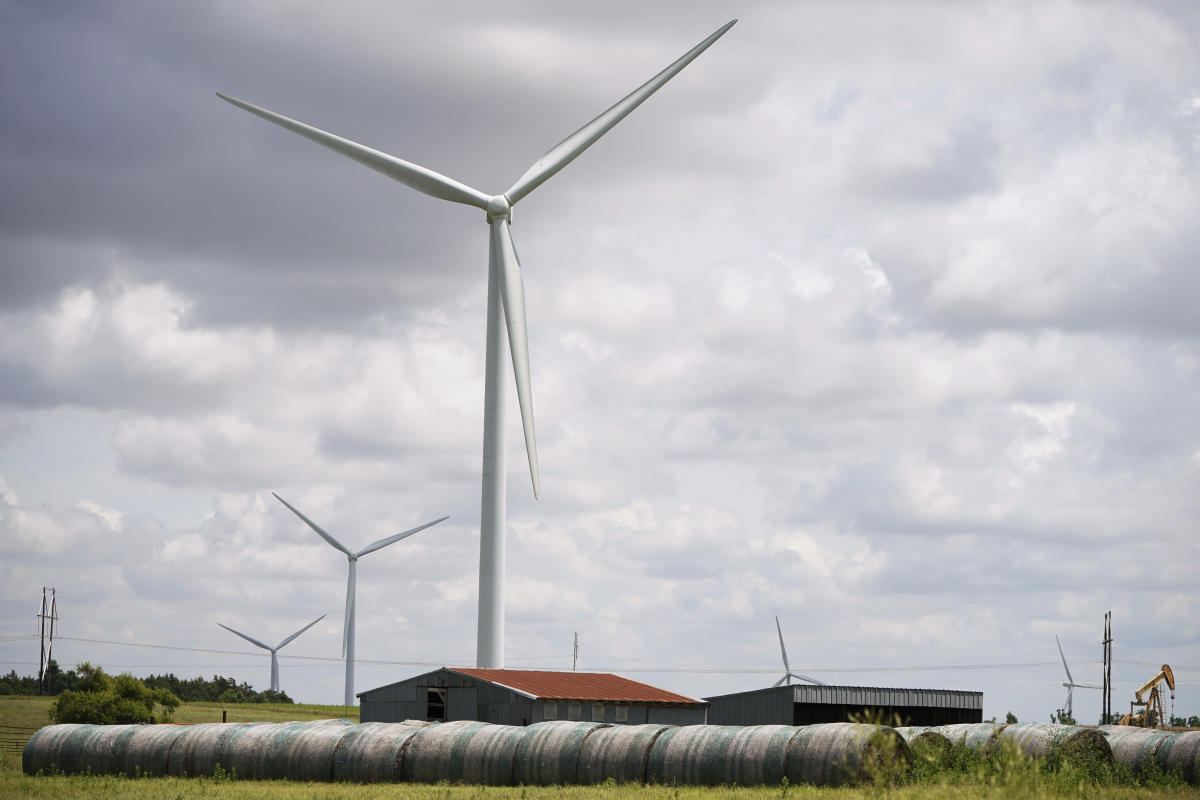
The United States is falling behind other countries in the race to mine minerals essential for climate-friendly technology because of its longstanding refusal to ratify an international treaty.
The European Union and 167 countries are working out rules this month governing the mining of deep-sea deposits, some of the richest sources of manganese, cobalt, copper and nickel that are ingredients in solar panels, wind turbines and electric-vehicle batteries. But the U.S. can’t take advantage of them because it’s never had enough political support to ratify the U.N.’s Convention on the Law of the Sea, which governs the use of ocean resources.
Mining proponents say that could jeopardize the Biden administration’s push for climate-friendly technologies and domestic supply chains. If foreign entities are able to secure the minerals first, it will further America’s reliance on other countries, as deep-sea mining companies have to be based in a country that’s party to the agreement.
“Is the U.S. missing an opportunity?” asked Gerard Barron, CEO and chair of The Metals Co., a Canadian mining firm pushing for more seabed exploration. “Yes. I think they are.”
One region between Hawaii and Mexico contains more copper, cobalt, nickel and manganese than is known in all land deposits combined. Mining companies are eager to begin undersea operations — The Metals Co. touts its exploration rights there as potentially containing enough minerals to build more than 250 million EV batteries.
The Biden administration cited a projected 400 to 600 percent increase in demand for critical minerals earlier this year as justification for reducing reliance on foreign sources. But dating back to the Reagan administration, the U.S. has refused to ratify the Law of the Sea treaty, which governs the International Seabed Authority talks underway in Kingston, Jamaica.
The international seabed group is looking to hammer out a complex regulatory scheme, royalty system, enforcement apparatus and set of protections for the marine environment that would allow countries to permit seabed mining by July 2023.
Ratification of UNCLOS is a requirement for a country to be part of the ISA and to sponsor a mining expedition. The treaty has been shelved in the U.S. Senate since Reagan declared his opposition to seabed mining provisions when it was initially signed in 1982. In 2004, the Senate failed to take action after the Foreign Relations Committee recommended ratification, and the same thing happened in 2007. In 2012, Senate Republicans sunk a Democrat-led effort to ratify UNCLOS. The Biden administration supports UNCLOS ratification.
There still isn’t sufficient Republican backing in the Senate to ratify UNCLOS, though Sen. Lisa Murkowski (R-Alaska) has signaled support. Duncan Wood, a vice president at the Wilson Center, said he doesn’t expect the stalemate to change any time soon.
“It’s a fundamental weakness that the U.S. will just have to sit by and watch other countries scoop up critical resources,” he said. “I don’t see any willingness on the part of Republicans to engage with the UNCLOS. And I think that that conversation will take a long time to work its way through.”
Republicans like Sen. John Barrasso (R-Wyo.) signed onto a letter the last time UNCLOS was brought up in the Senate in 2012, stating concerns that U.S. “sovereignty could be subjugated” under the treaty. Barrasso remains opposed to ratifying the treaty, a spokesperson said. Several other Republican senators didn’t respond to requests for comment.
The U.S. has had its own rules on the books for deep-sea mining since 1980, well ahead of the rest of the world. But without international recognition, companies are in a legal gray area when operating in areas outside of national jurisdiction. Just two exploration licenses are in effect in international waters through the U.S. regulations — both to defense giant Lockheed Martin Corp. — and none for actual mining.
Lockheed Martin sought an extension of its two exploration licenses in international waters from the National Oceanic and Atmospheric Administration earlier this year, citing the “lack of international recognition” of its licenses because the U.S. has not ratified UNCLOS.
Other companies are also hesitant to rely on U.S. rules. Issuing mining permits for seabed minerals outside of the international process could undermine America’s efforts to get adversarial nations like China and Russia to conform to a rules-based system on other issues, companies point out.
“While the USA has put in place the framework for allowing exploitation outside of areas of national jurisdiction, it would be very politically antagonizing to do so — and would likely immediately cause other actors to step outside of the ISA processes also, which isn’t something that would be of benefit to the U.S. or anyone,” said Renee Grogan, the chief sustainability officer of Impossible Mining, a seabed mining technology company.
Administration officials are aware of the logjam. Greg O’Brien, a senior ocean policy adviser at the State Department, said Lockheed Martin’s example shows why it’s difficult for the U.S. to pursue seabed mining outside of the ISA — and how that leads to business uncertainty.
“Investment capital is blocked because the potential lendee does not have security of title and tenure to those exploration sites,” he said at a Wilson Center forum last month. “There are obvious disadvantages of being an observer as opposed to a member of the Seabed Authority.”
The ISA’s talks aren’t guaranteed to produce a consensus on seabed mining. Some island nations and activists are pushing for a moratorium, citing environmental concerns, and France, Costa Rica and Chile are also urging caution. Some major potential customers, including BMW, Volvo, Volkswagen and Google, have also come out in support of a moratorium. There’s even debate at the U.N. itself: A recent report from the U.N. Environment Programme said there’s “no foreseeable way” deep-sea mining can be viewed as sustainable.
There are also other headwinds facing domestic seabed mining. Washington and Oregon have both banned it in state waters, citing environmental threats to marine life, and California lawmakers are considering a similar bill.
But because the U.S. failure to ratify UNCLOS appears to have frozen the industry domestically, the government isn’t doing outreach to the private sector to spur development — creating a feedback loop, said Saleem Ali, a professor of energy and environment at the University of Delaware.
It all comes as the U.S. has struggled to get new terrestrial mines operating and secure a domestic battery supply chain while demand for critical minerals is projected to surge as climate targets loom.
“We have never really been able to get consensus around UNCLOS and [agencies] are not really going out and recruiting the industry to engage,” Ali said. “That has led to some part of the atrophying of the domestic U.S. mining industry.”
Still, all hope isn’t lost for the U.S. to access seafloor minerals, even if it can’t mine the raw materials.
Failure to ratify UNCLOS doesn’t preclude the U.S. from partaking in mineral processing. That would require foreign entities mining the seafloor and allied nations to sell those minerals to a U.S. processing facility to turn them into the batteries and magnets that power electric vehicles and storage for solar and wind energy.
“Certainly there is an argument to be made that firms from those [allied] countries are better places perhaps than the Chinese and Russians,” Wood said.
Battery processing is something the Biden administration says it’s prioritizing through executive actions and provisions in the infrastructure law under the umbrella of clean energy jobs and a manufacturing rebirth. And it’s an attempt to reduce dependence on China, which dominates raw material refining and battery manufacturing, as the nation looks inward due to Russia’s invasion of Ukraine.
On this front, there may be industry interest.
Barron of The Metals Co., which has rights to three ISA-approved exploration contracts, said the company will apply for a mining contract in the second half of next year should regulations be adopted.
Barron, who wrote in March to Sens. Joe Manchin (D-W.Va.) and Barrasso — the top two members on the Senate Energy and Natural Resources Committee — said the U.S. could gain access to seabed minerals “with the right set of circumstances.”
“We need a deep water port, we need a stable political jurisdiction and we need access to cheap renewable power,” Barron said in an interview. “We’ve identified places in the U.S. that could fit that. The opportunity is there for the USA to build a bigger facility to service American industry. And we’re talking to customers ranging from those in the auto industry, those in the resources sector, and the battery sector as well.”
But commercial seabed mining is still years away, Ali said. That means the U.S. will still be waiting for quite some time to bear any fruits from the world’s potential foray into the sea’s minerals.




